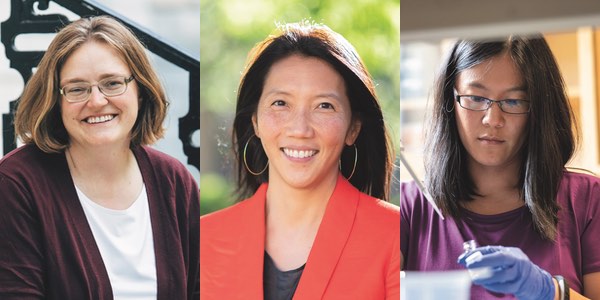
Melanie Matchett Wood '03, Emily Wang M.D. '03, Jenny Tung '03, Ph.D. '10
There must have been something special in the air at Duke in the early 2000s. Three alumnae from 2003 have now won “genius grants” from the MacArthur Foundation.
Melanie Matchett Wood ’03 and Emily Wang M.D.’03 were among the 2022 cohort awarded the prestigious fellowships. In 2019, Jenny Tung ’03, Ph.D.’10, a former Duke evolutionary anthropology professor, was honored.
Wood, a professor of mathematics at Harvard University, studies the foundations of pure mathematics. She specializes in number theory, which involves the properties and relationships of whole numbers, and algebraic geometry – the study of structures such as curves and surfaces that are described with polynomial equations.
While a student at Duke, Wood was an A.B. Duke Scholar and graduated as a Faculty Scholar, the highest student award presented by the university faculty. She led Duke to one championship and several top-five finishes in the highly challenging Putnam Mathematical Competition.
Wang, a primary care physician and professor at the Yale School of Medicine, researches the health-harming effects of incarceration and works to improve health outcomes for people leaving prison. In her clinical practice and research, Wang partners with people in the justice system to develop effective clinical services and to better understand the barriers they face when accessing health care.
Wang “is shining a light on complex health needs and inequities that are largely obscured from public view,” the MacArthur Foundation said.
Three alumnae from 2003 have now won “genius grants” from the MacArthur Foundation.
Tung was the fourth Duke professor to win the MacArthur prize while employed at the university, and the first in 27 years. Biochemist Jane Richardson won in 1985, primatologist Patricia Wright in 1989, and environmental scientist John Terborgh in 1992. Current math and engineering professor Ingrid Daubechies won the award in 1992 before coming to Duke.
Tung left Duke in 2022 for a leadership position at the Max Planck Institute for Evolutionary Anthropology in Leipzig, Germany. Max Planck, a collective of 83 institutions representing a wide range of scientific directions, is appealing to top scientists for its explicit focus on research freedom.
“There’s a lot of guaranteed support to pursue the types of research directions that the scientists here perceive as important,” Tung said. “And because of the stability of funding, that means that you can make long bets about research in a way that is often difficult to do when everything is grant funded.”
Tung leads a new department of primate behavior and evolution within her institute. Her research focuses on the behavior, life history and evolution of primates, and the importance of these areas for human health and animal conservation. She studies the interplay between genes and behavior to find out how social behavior influences genetic variation and gene regulation, and the flip side of that question – how genetic differences and gene regulation influence behavior.
“It has had a big impact on my career,” Tung said of the MacArthur fellowship. “It gives you more courage to put yourself in situations that feel uncomfortable and where you have a lot to learn, but you’re willing to stumble along the way. It gave me a little bit more feeling of security that I could just try new stuff.”
